
Live-in care in your own home
Our live-in care solutions help older adults stay independent and comfortable in their own home for longer. By choosing Live-in Care, a dedicated Care Professional can offer the ongoing support and companionship needed to enhance your loved one’s quality of life.
What is live-in care?
Live-in care involves a specially chosen Care Professional moving into a client’s home to provide companionship and practical support. This enables older adults to continue living life and enjoying their preferred routines and activities, while safe in the knowledge there is always someone around when needed. With live-in care, families get peace of mind knowing there is someone looking out for their loved one’s health and wellbeing, even when they can’t be there. Live-in care helps older adults to:
- Access care in the comfort of their own home, rather than in a residential care home
- Benefit from continuity of care from someone who lives in the home long-term
- Receive 1-2-1 care and personal attention from a dedicated Care Professional
- Enjoy having someone around to help with everyday tasks and offer companionship
- Make life easier, with help to get washed and dressed every day, attend appointments, or keep the house clean

Our Live-in Care Professionals
We know having someone move into the home can be daunting, so we use our relationship-led matching service to ensure an experienced, highly trained live-in Care Professional is chosen with your loved one’s specific needs and unique character in mind. We find the strongest care relationships are built from a foundation of genuine friendship, so when a live-in Care Professional resides in the home, they will carry out everyday tasks while also taking time to understand your loved one’s interests, preferences and personality. With industry-leading training, our Care Professionals offer a bespoke alternative to residential care, meaning your loved one can have all of their health and companionship needs met with 1-2-1 care from friendly faces in familiar surroundings.From light housework to grocery shopping, and cooking to attending healthcare appointments, a live-in Care Professional can help with everything an older adult needs to remain safe and happy in their own home.

Confused about home care? We can help.
We know you want the best for your loved one, so when it comes to arranging home care, we’ve made it easy with personalised, attentive care that adapts as your needs change.
Organising care shouldn’t feel like a trust fall. By taking the time to listen and understand your unique circumstances, we’re confident we can help your loved one live a more independent life at home, while helping you find balance as a caregiver.
From warm and friendly companionship, to specialised, practical care that puts their needs and preferences first, we are changing the way people think about home care.
Whatever questions you would like answered, we’re here to put your mind at ease – with no pressure to make a decision until you feel ready.

How can we help?
We've helped thousands of families to stay safe, comfortable and happy at home. Whatever situation you're facing, or whatever the question is, Home Instead is here to help.
Are you in need of a little guidance right away?
03300 583450Are you in need of a little guidance right away?
03300 583450Let's have a chat to
see how we can help
Guides
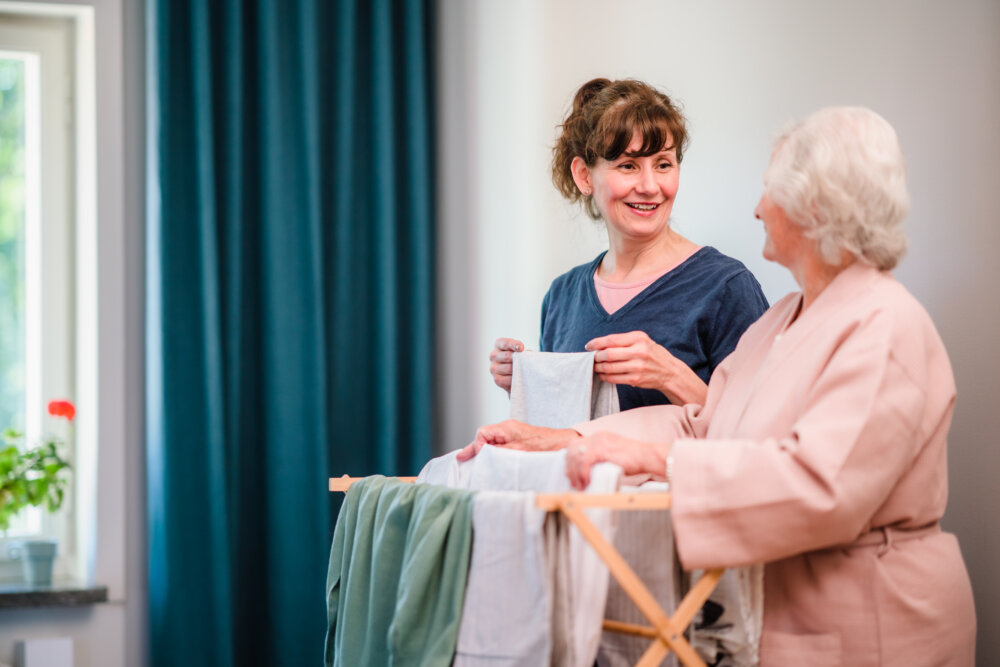
What is Live-in Care?

Live-In Care vs nursing & care homes

Assisted living, or Live-in Care?
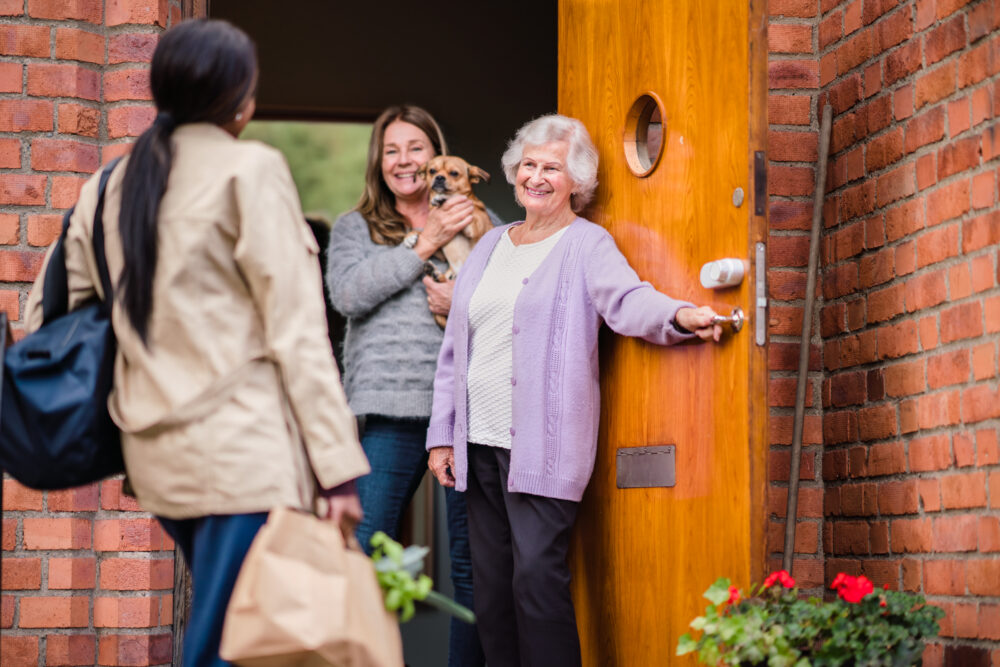
The role of Live-in Respite Care

How much does a Live-In carer cost?

How does Live-In Care work?

Is Live-in Care the answer?

The carer transition from Respite to Live-in
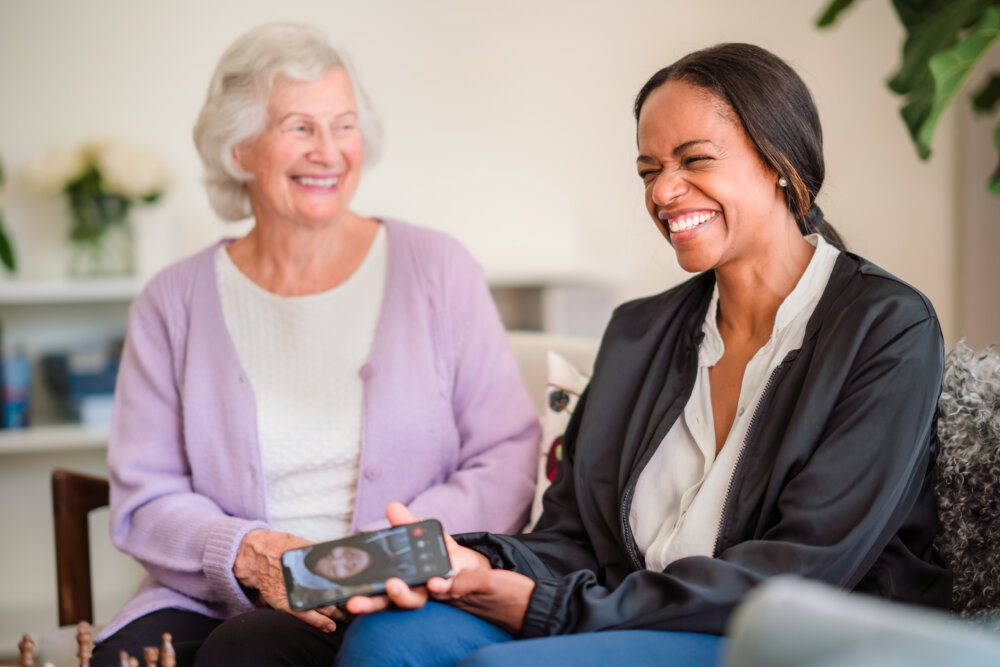
Arranging care & living with a carer
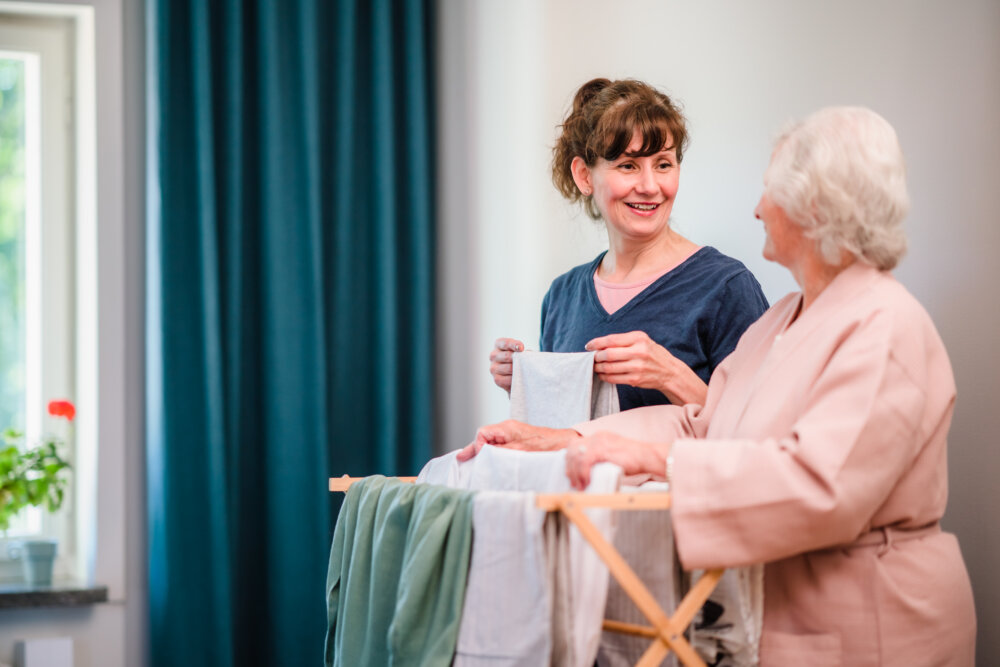
Living better with Live-in Care
The benefits of live-in care
For many older adults, live-in care can be a life-changing alternative to moving into residential care. Some of the benefits your loved one could enjoy include:
- Staying in their beloved home without compromising on care quality
- Dedicated support from a Care Professional they – and your family – grow to trust
- Better affordability as an alternative to hourly care or a residential facility
- Enhanced safety and peace of mind, knowing someone is around at night if needed
- Reduced loneliness by having a companion around throughout the day
If your loved one does not require constant care, or they would prefer more alone time, our day care options could be a better fit. This means a Care Professional would be available on and off throughout the day to help with daily living activities, but not overnight, which could make care more affordable.

Why choose live-in care?
As well as an older adult’s daily care needs – such as personal care or specialist care – having companionship, regular mental stimulation, and continuity of care is so important when receiving care in the home environment.
Just like our other care services, live-in care can be highly personalised to help your loved one live on their terms with a routine that gives them fulfilment and purpose. If you are unable to regularly visit due to distance or other commitments, our experienced live-in Care Professionals can make sure your loved one remains happy, content, and engaged.
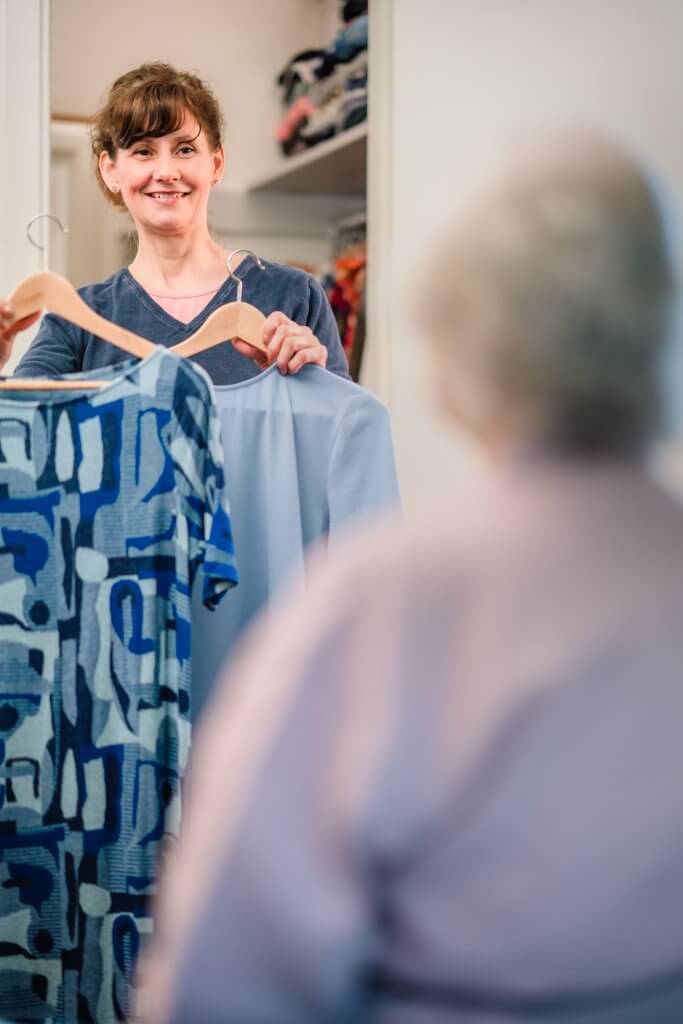
Who could benefit from live-in care?
Live-in care is adaptable to many situations and conditions, and at Home Instead, we believe in live-in care that is companionship-led. Our Care Professionals go the extra mile to get to know the person they are caring for, and enjoy fun activities with them to enhance their wellbeing. Some circumstances where live-in care could be beneficial include:
- Respite or short-term live-in care offers families a much-needed break from caring duties, or when the person’s needs quickly increase, such as after a hospital stay
- Specialist live-in care helps people with conditions such as dementia, Alzheimer’s or Parkinson’s, to continue living independently and confidently at home
- Live-in palliative and end-of-life care can help to meet complex needs and provide dignity and consistency during the most difficult times
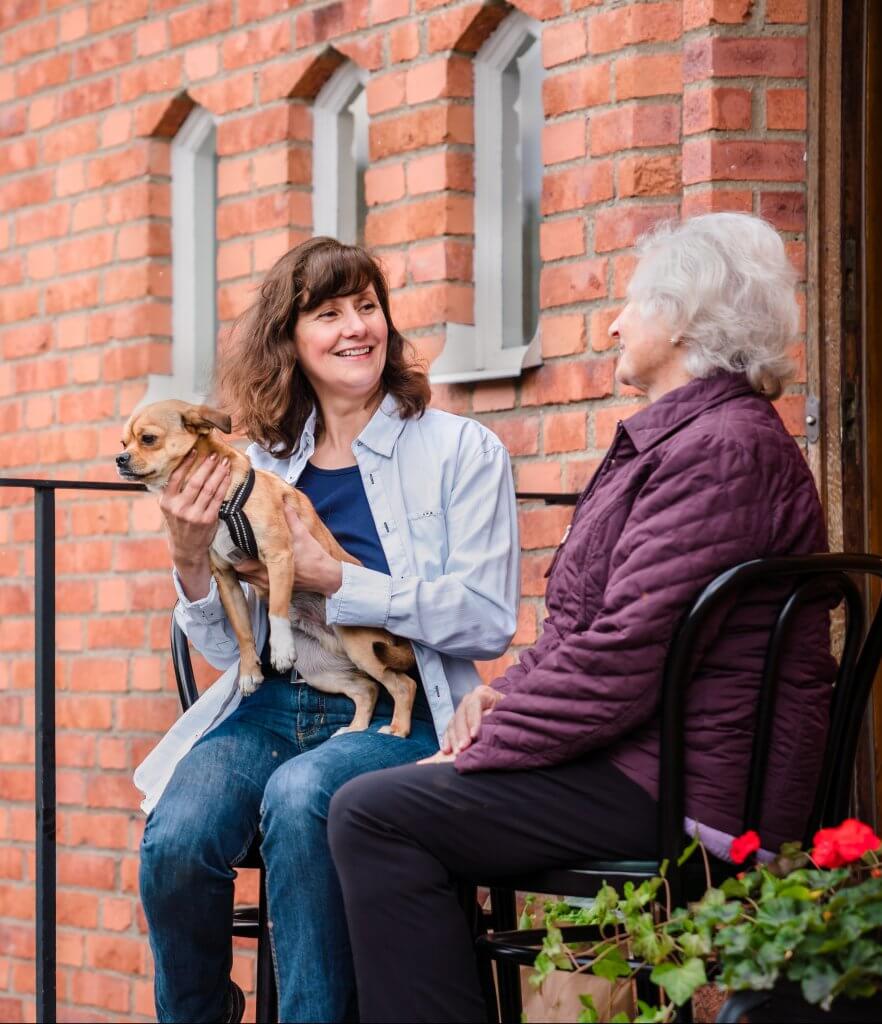
Advice & Support

Pre-Bereavement Grief
Discover more

Looking for Respite Care? Look no further than the home
Discover more

Why getting Respite Care is the trick to being a good family caregiver
Discover more

New Dementia Training
Discover more

Making communities dementia friendly
Discover more

Stepping into the shoes of someone with dementia with Training2Care’s Dementia Bus
Discover more
FAQs
What is Live-in Care?
Live-in care is a form of long-term care where a trained Care Professional resides in the same home as the care recipient, providing around-the-clock assistance and support with various daily tasks and personal needs. This type of care is particularly beneficial for individuals who require continuous supervision and assistance due to medical conditions, disabilities, or age-related limitations. The live-in Care Pro offers a wide range of services, including help with personal hygiene, medication management, meal preparation, mobility assistance, household chores, and emotional companionship. Unlike traditional care facilities or “care homes”, live-in care allows the care recipient to remain in the comfort of their own home while receiving dedicated, personalised care. This arrangement not only promotes a sense of familiarity and independence but also establishes a close, one-on-one relationship between the Care Professional and the care recipient, fostering a far more supportive and happy environment.
How much does Live-in Care cost?
The cost of live-in care can vary significantly based on several factors such as the location, the level and complexity of care needed (simple housekeeping or companionship care will be less costly than complex healthcare support, for example), and the provider you choose. Live-in care does tend to be more expensive on average than many other types of care due to the continuous presence of a Care Professional. Costs might encompass the caregiver’s wages, accommodation, meals, and in some cases, benefits. Nevertheless, considering the potential savings from not having to move to a care facility, live-in care can offer a cost-effective alternative for those who prefer to age or recover in the comfort of their own home rather than a residential care facility.
Who is Live-in Care for?
Live-in care is designed to support individuals who require assistance, supervision, and companionship on a continuous or even 24 hour basis due to various factors that affect their ability to live independently. This arrangement is particularly beneficial for the elderly who wish to maintain their independence at home while receiving help with daily activities like grooming, meal preparation, and medication management. It’s also suitable for those with disabilities who require constant support to enhance their quality of life and ensure their safety. A live-in care professional provides continuous support, companionship, and peace of mind to both the care recipient and their families.
How does Live-in Care work?
Live-in care involves a Care Professional residing with an individual who requires assistance and support on a continuous basis. Like all other forms of home care, it starts with an assessment of needs, after which the right Care Professional for the recipient is selected based on skills, experience and personality fit, then a detailed care plan is developed, after which the carer moves into the home. Most Care Professionals work on a rotational basis so that they can still have time off without interrupting care, and contingency plans will also be put in place to ensure care is not interrupted if sickness or other circumstances cause the primary Care Professional to be unavailable, but the aim is still to have consistent and familiar care from a single caregiver in order to promote a comfortable relationship in a familiar environment.
What are the benefits of Live-in Care at home?
Live-in care at home empowers the elderly to maintain their independence, dignity, and a sense of control over their lives, while still receiving dedicated, comprehensive support. By far the main benefit is that Live-in care allows care recipients to remain in the comfort and familiarity of their own home, which can significantly enhance emotional well-being and quality of life. This form of care is highly personalised, adapting to the specific needs and routines of the individual, ensuring tailored support for daily activities, medication management, mobility assistance, and more. The one-on-one nature of live-in care fosters a strong bond between the Care Professional and care recipient, providing companionship and reducing feelings of isolation. Staying at home eliminates the disruption and stress often associated with moving to a care facility, and even 24 hour care with a live-in carer can also be considerably more cost-effective than residential care options, as it avoids facility fees which can often be extremely steep.
Why choose Live-in Care for the elderly?
Choosing live-in care for the elderly offers a multitude of advantages that cater specifically to their needs, allowing them to age gracefully within the familiarity and comfort of their own homes, preserving cherished routines and memories. With a dedicated Care Professional always present, there’s continuous support available for daily activities, medication management, mobility assistance, and more. The personalised nature of live-in care ensures that the elderly receive individualised attention that respects their preferences and maintains their dignity, and also fosters emotional well-being by minimising feelings of loneliness and isolation that can often arise in traditional care settings. Elderly adults and their families appreciate the strong bond that forms between the Care Professional and care recipient, promoting companionship and enhancing the overall quality of life during their later years.
How to arrange Live-in Care.
Arranging live-in care with Home Instead is as easy as getting in touch with us by phone on 03300 583450, or making a care enquiry online. Your local office will get in touch with you for an initial discussion and needs assessment, and then get to work to find and introduce the best Care Professional fit to act as the primary carer, while also handling arrangements for continuous cover contingencies so care remains uninterrupted even in case of primary caregiver illness, as well as during their holiday breaks.
How many hours does the Care Professional work?
Live-in Care is not the same as 24-hour care. A Care Professional will typically work an 8 to 10 hour day. Those hours will be discussed in your initial assessment and tailored to suit the needs of the person receiving care. A Live-in Care Professional is of course on hand in case of emergencies, but it is not generally expected that they will provide ongoing night care. A Care Professional also needs to have breaks throughout the day and other Care Professionals may visit the home if a wrap-around care service is offered, giving the main care provider their needed breaks without any interruption in support.
What does a Care Professional’s rota look like?
A Live-in Care Professional’s rota can vary depending on the specific needs of the client, the type of care required, and the preferences of the individuals involved. The Care Professional will typically take up residence with the client and vacate the property when they have days and weeks off. When you are matched to a Care Professional, at the outset you will understand their expected working pattern, and an additional person may be recruited to fill the periods when they are arranged to be absent. This might mean that you have multiple Care Professionals working alternative schedules, meaning that the client receives continuity of care from friendly, familiar faces.
What is it like to have Live-in Care?
Having Live-in Care provides a transformative experience for elderly individuals needing support. Imagine having a compassionate Care Professional right by your side, assisting with daily tasks, from meal preparation and grooming to medication reminders. The constant presence of a caring companion fosters a sense of security and companionship, promoting emotional well-being. This arrangement ensures you can continue to enjoy the familiarity and comfort of your own home while receiving tailored assistance, ultimately enhancing your quality of life and independence.
What will a Live-in Care Professional require?
A Live-in Care Professional must have their own bedroom for personal space. It is also typically expected that the home has an internet connection. Arrangements for food will be discussed in your consultation, but the Care Professional typically receives a weekly food allowance to purchase food for themselves. Live-in Care Professionals may cook and eat with their clients, or they may decide to do this separately, depending on the dietary requirements and personal preferences of everyone involved.
How much does it cost to have live-in residential care vs a live-in carer?
Residential care, often provided in nursing homes or assisted living facilities, typically involves a fixed monthly fee that covers accommodation, meals, and various levels of care and support, but provided in a group setting. On the other hand, a Live-in carer’s cost will encompass their wages, possibly accommodation and meals, but focuses solely on the personalised care they provide. While residential care might seem more convenient in terms of all-inclusive services, it can be considerably more expensive due to facility overheads, and care quality is not the same as the one-on-one support provided by a Live-in carer. Live-in Care Professionals offer a far more individualised and potentially cost-effective alternative, allowing the care recipient to stay in their own familiar environment. The most cost effective option will vary depending on needs and circumstances, so be sure to shop around different facilities and care solutions to find the one that feels best for you.






